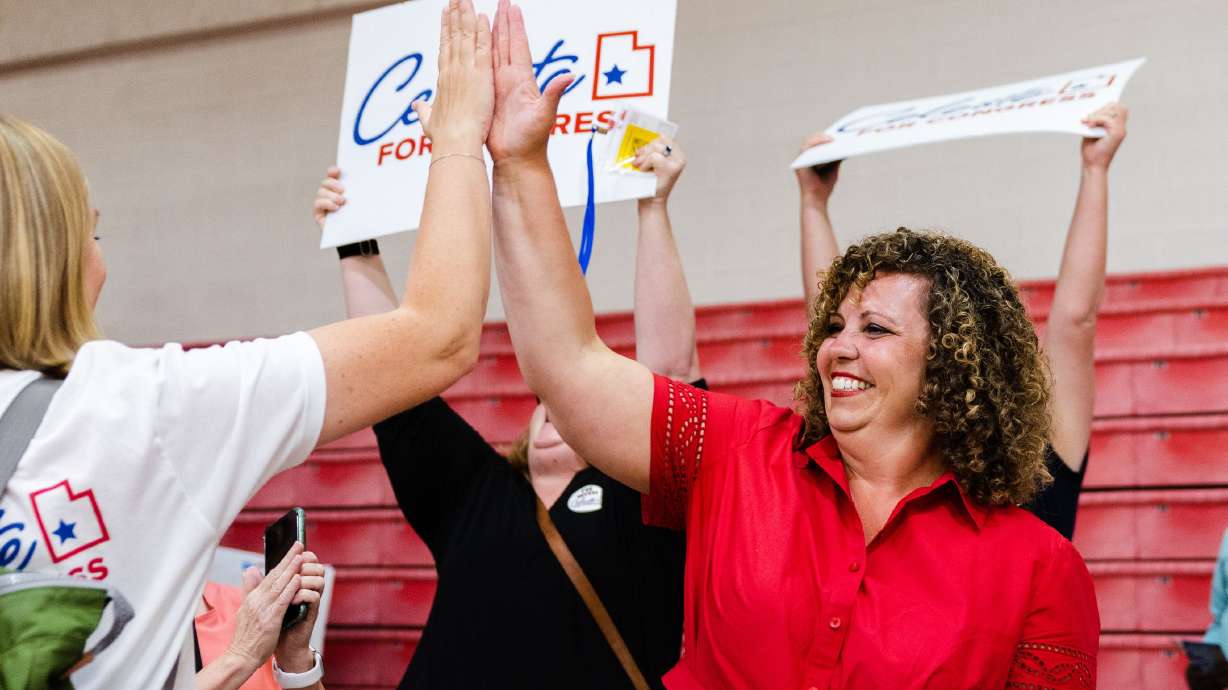Estimated read time: 5-6 minutes
This archived news story is available only for your personal, non-commercial use. Information in the story may be outdated or superseded by additional information. Reading or replaying the story in its archived form does not constitute a republication of the story.
SALT LAKE CITY — A judge denied a request Monday to temporarily remove Celeste Maloy's name from the 2nd Congressional District special election ballot.
In a lawsuit filed earlier this month, Quin Denning — who lost to Maloy in the Utah Republican Party convention in June — argues that Maloy's inactive voter registration when she filed as a candidate makes her ineligible for the primary ballot. The case can still move forward in court, but 3rd District Judge Andrew Stone denied a request from Denning's team to have Maloy struck from the ballot while litigation plays out.
Restraining orders or preliminary injunctions are sometimes granted at the start of a trial, which temporarily enforce a judge's orders before a final decision is made.
Stone said there is a high bar for the type of injunctive relief sought by Denning, and said the balance of harm "dramatically" favors Maloy, whose candidacy could be severely damaged if she were removed from the ballot temporarily — even if a judge ultimately ruled in her favor down the line.
Denning declined to comment on whether he will appeal Stone's decision to the Utah Supreme Court.
"This whole lawsuit was about compliance with the law and the code, and the judge made his decision and we respect that," Denning told reporters after the hearing.
What the lawsuit alleges
The lawsuit mirrors complaints raised by party delegates, other candidates and members of the Utah Legislature in the days following Maloy's convention win.
It claims that she is ineligible because her voter registration was inactive and on a list to be removed from the rolls on the day she filed. Maloy registered to vote as a Republican in 2016, but didn't vote in the last two elections in Utah because she was working for Rep. Chris Stewart in Washington at the time.
Utah Lt. Gov. Deidre Henderson, whose office oversees state elections, said she became aware that Maloy's voter status was inactive as of the candidate filing deadline, and said she informed the campaign as a courtesy. Maloy updated her registration prior to filing the necessary paperwork with the GOP.
The Utah Republican Party and Henderson have affirmed Maloy's eligibility as a member of the party, and GOP Chairman Robert Axson submitted her name as the convention winner on July 5.
The complaint was filed under a section of Utah election code that stipulates that a candidate "may not ... file a declaration of candidacy for a registered political party of which the individual is not a member, except to the extent that the registered political party permits otherwise in the registered political party's bylaws."
It also requires a candidate to state whether they are a member of the party before filing a declaration of candidacy.
Registration vs. party affiliation
Chad Shattuck, Denning's lawyer, argued that because Maloy's voter registration was inactive when she filed, she is not a legal candidate. He said Denning has standing to sue because he is harmed as a voter by being "compelled" to consider a candidate on the ballot who is ineligible.
"The reality is, the law has not been complied with," he said.
However, defense attorneys pointed to a separate section in Utah code that states that "an individual who is nominated by, or seeking the nomination of, the qualified political party is not required to comply" with the earlier section, arguing that it gives broad latitude to the party to consider membership.
Defense attorneys also disputed many of the facts alleged in the complaint, saying that active registration isn't the same thing as party affiliation, and said the U.S. Supreme Court has established political parties as the "gatekeepers" of membership.
They also argued that removing Maloy from the ballot would affect the rights of voters, by not allowing them to consider a candidate who was chosen by one of the two major political parties.
Removing Maloy's name from the ballot with a restraining order is an "extraordinary remedy," which shouldn't be issued unless the case is "clear and unequivocal," said Lowry Snow, one of the defense attorneys.
Utah law and party rules provide methods to challenge a candidate's eligibility, but those must be filed within 10 days of the election. The defense argued that Denning's lawsuit falls outside of that window, and that he didn't go through the proper channels to formally notify the party of the alleged ineligibility.
Shattuck said Denning brought the lawsuit together after learning of the mistake on July 5, the day the GOP submitted Maloy's name to the elections office.
"Could it have been faster? Sure," he said, but added, "It's not the fault of the person trying to enforce the law, it's the fault of the person breaking the law."
Defense disputes claims about residency
Denning also challenged Maloy's residency status in the state, which is a requirement under the Utah Republican Party Constitution.
While working for Stewart, Maloy filed income taxes in Virginia, but has repeatedly stated that she never received Virginia residency while she worked there, and never registered to vote outside of Utah during that time.
In May of 2020 — after she began working for Stewart in Washington — Maloy renewed her Utah driver's license which showed the same address in Cedar City she listed as her permanent residence on her candidacy paperwork, Snow said.
Stewart will step down from his seat in September because of his wife's health concerns. The special Republican primary election to replace him will be held Sept. 5, setting up a tight window for the courts to hear out any potential appeals.
Contributing: Lindsay Aerts









